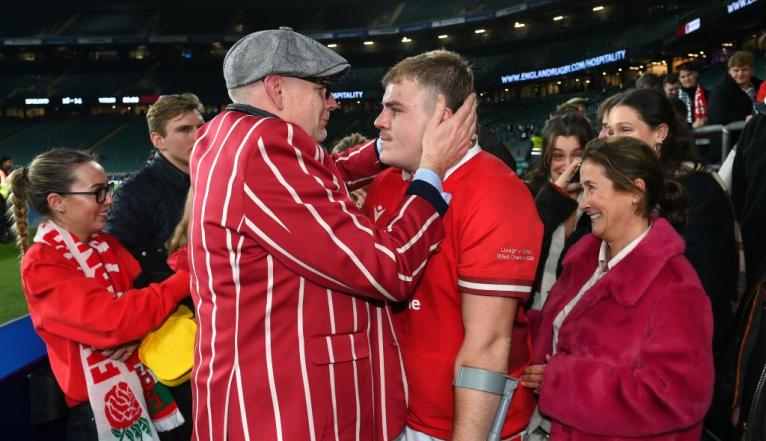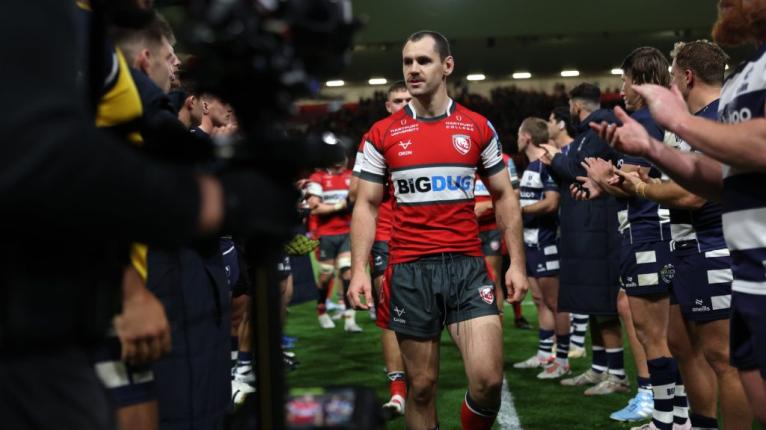On the eve of the first Test between Australia and Wales in July, young Melburnian debutant Isaac Kailea was surprised to discover his opponent in the front row would not be some gnarled scrum ogre from the valleys, but a fellow fresh-faced Aussie. Archie Griffin was born in Sydney, and he was starting his first match for his country at the ripe old age of 22.
It has been a long and winding road. The latest hope of the Welsh front-row found his way into Warren Gatland’s starting selection via New South Wales, Singapore, Marlborough College in Wiltshire and the University of Bath in Somerset.
Griffin was offered a professional contract with Bath in 2019 but the romance of the journey ends there. The context to Griffin’s selection paints a rather darker picture for the future of Welsh rugby: a tale more Bates Motel than Harry Potter.

Over two-and-a-half seasons with Bath, Griffin has played only 340 minutes of rugby and started no games at all in the Gallagher Premiership proper. At the same time, he has played 309 minutes for Wales and averages 15 more minutes per game for his country than he does for his club in the Autumn Nations Series alone.
In his first start on 6th July at the Allianz Stadium in Sydney, Griffin almost went the whole hog – on the field for 74 minutes while completing 33 combined tackles and carries, the highest number of attacking and defensive involvements by any Welsh front rower for the past 15 years.
But Griffin’s salute after the match raised as many questions as it attracted plaudits.
“I got a lot of game time so I was chuffed to bits,” he said. “It has been a while since I played 74 minutes, probably a university game.
“It was a moment where I realised, ‘I can do this’. You get picked for a reason at international level and I need to show why again in this [November] camp.
“The time for us having excuses about being a young Wales squad is over. We’ve got to get a win.”
It needed a full Wales training camp to remind Griffin of his potential because at Bath, he is in danger of forgetting it. He just doesn’t get enough game time to remember.

At the Recreation Ground, Griffin is ranked third, behind two international-quality tight-heads in the shape of Englishman Will Stuart and South African monster Thomas du Toit. By the end of the current season, he could drop to fourth, with England looking to develop a new generation of tight-head props and recent under-20 prodigy Billy Sela moving into the spotlight.
Griffin recently agreed a three-year contract extension with Bath, but how will he ever accumulate enough meaningful club experience to develop within the timeframe required by his country?
It leaves Gatland effectively trying to balance on his head, but upside-down has been the new normal for a while now. The greatest Welsh tight-head of the professional era, Adam ‘Bomb’ Jones played his club rugby for first Neath and then the Ospreys upon the introduction of the regional system in 2003-2004, but has now taken all his considerable IP with him to Harlequins in West London.
The hair bear’s long-term replacement became one of Gatland’s ‘old dependables’, but Tomas Francis plied his trade for the Champions Cup-winning Exeter Chiefs in the club’s peak years between 2014 and 2021. Five of Gatland’s November squad play at Gloucester – scrum-half Tomos Williams, fly-half Gareth Anscombe, centre Max Llewellyn, back three Josh Hathaway and lock Freddie Thomas. The Cherry and Whites are now laughingly known as ‘the fifth Welsh region’. They are probably better than any of the other four.

The most damaging implication is in the joke. Welsh regional rugby has failed conclusively in its current form and there is no way back. It exists in the same relationship to England and the rest of Europe as Australian Super Rugby franchises do to their New Zealand counterparts.
There are no winners showing in the paddock in either nation. The highest Welsh finishers in last season’s URC were the Ospreys in eighth. Three of the four regions languished in the bottom five of the competition, swelling the cellar with only 12 wins in 54 games played. Australian franchises fared little better: take out the Brumbies and the remaining four franchises achieved 19 wins from 57 games.
At the end of tournament, the Melbourne Rebels franchise was dissolved and Griffin’s Sydney antagonist Kailea packed his bags for a new home with the Waratahs. An excellent account of the Rebels’ drowning wave can be found here.
Most of the Welsh emigrés end up in English leagues – 44 in the top tier and another 26 in the Championship. If Australian players such as Will Skelton or the Arnold twins want to win silverware in their playing lifetimes, they move to France. An estimated 200 players from both countries currently ply their trade abroad, and the top of the international pyramid cannot thrive if the domestic base is starving. It is now 10 years since an Australian club celebrated a Super Rugby title, and seven since a Welsh region won the URC, back when it was the Pro 12 in 2016-17.
Gatland held off the tide of failing regional cultures for a few years in his first incarnation as Welsh coach, and Joe Schmidt is performing the same Canute-like miracle for Australia at present, but ultimately the scales of testimony are weighted against both. Welsh coaches since the 2019 World Cup have a win rate of 32.7%, compared to 37.7% for the Wallabies.
Gatland acknowledged the problem after Saturday’s 45-12 defeat by world champions South Africa.
“For a long time, there have been issues within the game [in Wales],” he said. “The success we have had in the past [at national level] has probably papered over some of those cracks.
“We have talked about the dam bursting, and it has. It’s going to take a little time to fix it and get back on track.
“There needs to be change and there needs to be agreement with the regions to put some positive steps in place and effect change.
“It won’t happen overnight but we need to be bold with our decisions for the future of the game, with investment into the pathways, the academies and under-20s programme. That should be the lifeblood of the game in Wales.”
In his more private, off-the-record moments, Schmidt would probably echo the same sentiments as Gatland, verbatim. With the retirement from international rugby of the likes of Alun Wyn Jones, Jonathan Davies, Leigh Halfpenny and Dan Biggar, Wales lost the last tier of elite players who had learned how to win at international level.
For Australia, the same effect probably occurred much earlier. The last time the Wallabies won a Rugby Championship was back in 2015 and they have not held the Bledisloe Cup since 2002. Creating pathways is never sufficient, if you do not produce enough winning cultures alongside them.
On the field, this is often reflected as patchy and inconsistent performance. When the stars align, young players such as Griffin can enjoy a glimpse of the future and channel their full potential – as the Bath prop did in Sydney against James Slipper and Kailea, and in opposition to Angus Bell only a couple of weeks ago.
Even in defeat agaisnt the Wallabies, Wales managed to win the only two scrum penalties, and in this clip it is number three Griffin who forces Bell to pull out of the contest first.
The lack of exposure to enough problem-solving scenarios at club level came back to haunt the Welshman when opposed by club-mate Du Toit one week further on. Du Toit normally packs down on the same side of the scrum as Griffin, but his coach Rassi’ Erasmus obviously foresaw the right moment to exploit some inside information from the Rec. Unlike Wales, the Springbok ‘prop pyramid’ is built on rock-solid foundations: Du Toit has made over 100 appearances for the Sharks, another 28 for his country, and he is probably the best tight-head in the Premiership, but he is still ranked no higher than second or third in the South African pecking order.
Griffin found his own scrum foundations were anything but rock solid in opposition to ‘the Tank’.
If a tight-head cannot keep his feet on the ground, he cannot provide a consistent platform for his team. Wales managed to work the ball off the base in this example but the writing was already on the wall for the Welsh front-row.
When you are winning the scrum penalty count by 6-0, as the Springboks did against Wales, you do not really need to fish in the pond of Tony Brown-inspired subtleties to win Test matches. You can just give the ball to Jasper Wiese and Elrigh Louw instead.
Gatland’s future as coach of the national team is on the line after Wales’ 12th consecutive defeat. In truth, whoever the Welsh Rugby Union – or for that matter Rugby Australia – chooses to be their national coach, there is only so much they can do remedy the underlying problems besetting the game in both countries. A dab of bright paint on a rotting piece of wood is not enough.
Wales and Australia got their versions of regional rugby badly wrong over the last 20 years. The absence of winning cultures created within it, the lack of connection to the club game beneath it, and even to the support base beyond it are common to both. Now is the time to admit it, seek redress and a new ground zero from which to rebuild.


But it never stopped them advancing to end stages of comps John, they have been the most successful Aussie franchise for over 20 years now.